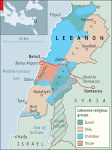I just got off the phone with a Beirut real estate developer who said that in the few hours between the announcement of the political settlement this morning and now, prices for new apartments in the Ras Beirut neighborhood have already risen by about twenty percent. Such a jump may be good news for investors and property owners but it will also mean an increase in rent, which will hurt the middle and lower classes.
This highlights one of the fundamental contradictions of urban property under capitalism: that which qualitatively improves living conditions, quantitatively increases the costs of living there. There is scarcely a person living in Beirut who wants more violence, bloodshed, or political instability, but so long as the market is left to determine the price of housing, peace and stability will make it more expensive for people to live.
The answer, by all means, is not to encourage armed violence or political tensions. Instead, Lebanon, like the rest of the capitalist world, needs to institute policies that guarantee affordable and adequate housing for even the poorest of residents. Lebanon does have a rent control law, but this only applies to leases that were signed before July 23, 1992.
The rise of luxury apartment buildings in several (mostly seaside) neighborhoods in Beirut over the past few years has already sent real estate prices soaring, however tempered in the past year up until this morning by the political crisis. The price of a new apartment runs around US$1 million and a (post 7/23/92) one-bedroom flat rents for at least US$700-900 at the lower end of the scale. This, in a country where 28.5% of the population lives in poverty, many of whom are in Beirut.
So the need for new laws that prevent landlords from indiscriminately raising rents has never been greater. The poor and middle classes should be able to enjoy peace and stability as well.
Subscribe to:
Post Comments (Atom)

No comments:
Post a Comment